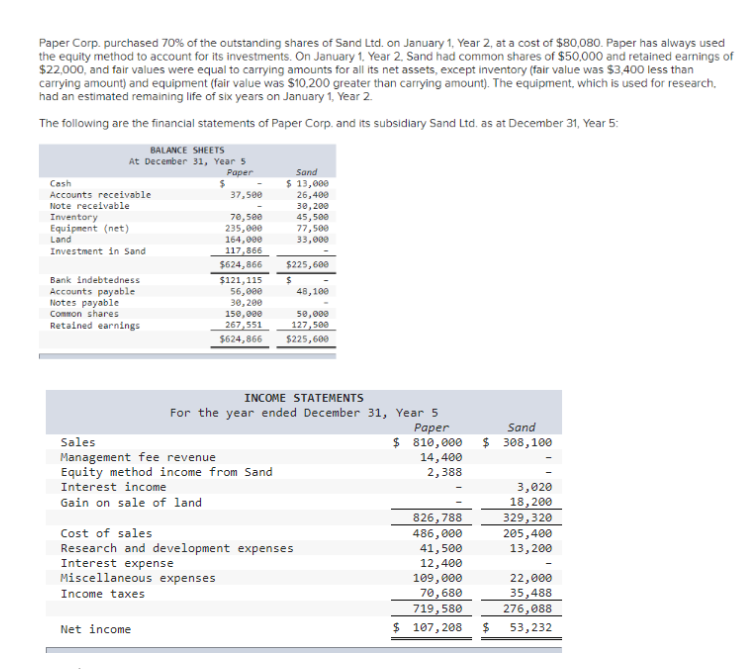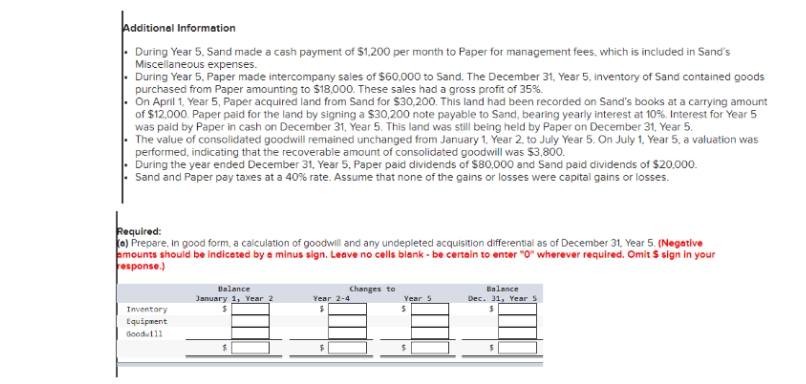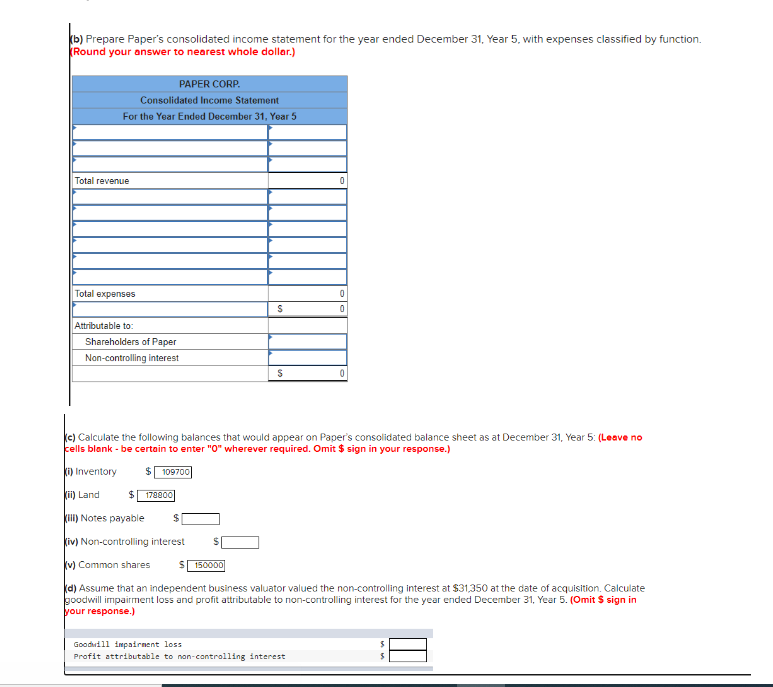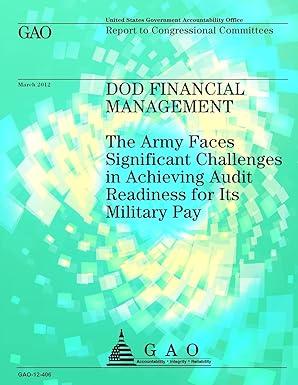


Paper Corp. purchased 70% of the outstanding shares of Sand Ltd. on January 1, Year 2, at a cost of $80,080. Paper has always used the equity method to account for its investments. On January 1. Year 2. Sand had common shares of $50,000 and retained earnings of $22,000, and fair values were equal to carrying amounts for all its net assets, except inventory (fair value was $3,400 less than carrying amount) and equipment (fair value was $10.200 greater than carrying amount). The equipment, which is used for research, had an estimated remaining life of six years on January 1, Year 2. The following are the financial statements of Paper Corp. and its subsidiary Sand Ltd. as at December 31, Year 5: Additional Information - During Year 5. Sand made a cash payment of \$1.200 per month to Paper for management fees, which is included in Sand's Miscellaneous expenses. - During Year 5, Paper made intercompany sales of $60,000 to Sand. The December 31, Year 5, inventory of Sand contained goods purchased from Paper amounting to $18,000. These sales had a gross profit of 35%. - On April 1, Year 5, Paper acquired land from Sand for $30,200. This land had been recorded on Sand's books at a carrying amount of $12,000. Paper paid for the land by signing a $30,200 note payable to Sand, bearing yearly interest at 10%. Interest for Year 5 was paid by Paper in cash on December 31, Year 5 . This land was still being held by Paper on December 31 , Year 5. - The value of consolidated goodwill remained unchanged from January 1, Year 2, to July Year 5. On July 1, Year 5, a valuation was performed, indicating that the recoverable amount of consolidated goodwill was $3,800. - During the year ended December 31, Year 5 , Paper paid dividends of $80,000 and Sand paid dividends of $20,000. - Sand and Paper pay taxes at a 40% rate. Assume that none of the gains or losses were capital gains or losses. Required: (a) Prepare, in good form, a calculation of goodwill and any undepleted acquisition differential as of December 31, Year 5 . (Negative emounts should be indicated by a minus sign. Leave no cells blank- be certain to enter "O" wherever required. Omit \$ slgn in your response.) (b) Prepare Paper's consolidated income statement for the year ended December 31 , Year 5, with expenses classified by functior (Round your answer to nearest whole dollar.) (c) Calculate the following balances that would appear on Paper's consolidated balance sheet as at December 31, Year 5: (Leave no cells blank - be certain to enter "0" wherever required. Omit $ sign in your response.) (i) Inventory \$\$ (ii) Land \$ (iii) Notes payable $ (iv) Non-controlling interest $ (v) Common shares 5 (d) Assume that an independent business valuator valued the non-controlling interest at $31,350 at the date of acquisition. Calculate goodwill impairment loss and profit attributable to non-controling interest for the year ended December 31, Year 5 . (Omit \$ sign in your response.) Paper Corp. purchased 70% of the outstanding shares of Sand Ltd. on January 1, Year 2, at a cost of $80,080. Paper has always used the equity method to account for its investments. On January 1. Year 2. Sand had common shares of $50,000 and retained earnings of $22,000, and fair values were equal to carrying amounts for all its net assets, except inventory (fair value was $3,400 less than carrying amount) and equipment (fair value was $10.200 greater than carrying amount). The equipment, which is used for research, had an estimated remaining life of six years on January 1, Year 2. The following are the financial statements of Paper Corp. and its subsidiary Sand Ltd. as at December 31, Year 5: Additional Information - During Year 5. Sand made a cash payment of \$1.200 per month to Paper for management fees, which is included in Sand's Miscellaneous expenses. - During Year 5, Paper made intercompany sales of $60,000 to Sand. The December 31, Year 5, inventory of Sand contained goods purchased from Paper amounting to $18,000. These sales had a gross profit of 35%. - On April 1, Year 5, Paper acquired land from Sand for $30,200. This land had been recorded on Sand's books at a carrying amount of $12,000. Paper paid for the land by signing a $30,200 note payable to Sand, bearing yearly interest at 10%. Interest for Year 5 was paid by Paper in cash on December 31, Year 5 . This land was still being held by Paper on December 31 , Year 5. - The value of consolidated goodwill remained unchanged from January 1, Year 2, to July Year 5. On July 1, Year 5, a valuation was performed, indicating that the recoverable amount of consolidated goodwill was $3,800. - During the year ended December 31, Year 5 , Paper paid dividends of $80,000 and Sand paid dividends of $20,000. - Sand and Paper pay taxes at a 40% rate. Assume that none of the gains or losses were capital gains or losses. Required: (a) Prepare, in good form, a calculation of goodwill and any undepleted acquisition differential as of December 31, Year 5 . (Negative emounts should be indicated by a minus sign. Leave no cells blank- be certain to enter "O" wherever required. Omit \$ slgn in your response.) (b) Prepare Paper's consolidated income statement for the year ended December 31 , Year 5, with expenses classified by functior (Round your answer to nearest whole dollar.) (c) Calculate the following balances that would appear on Paper's consolidated balance sheet as at December 31, Year 5: (Leave no cells blank - be certain to enter "0" wherever required. Omit $ sign in your response.) (i) Inventory \$\$ (ii) Land \$ (iii) Notes payable $ (iv) Non-controlling interest $ (v) Common shares 5 (d) Assume that an independent business valuator valued the non-controlling interest at $31,350 at the date of acquisition. Calculate goodwill impairment loss and profit attributable to non-controling interest for the year ended December 31, Year 5 . (Omit \$ sign in your response.)









